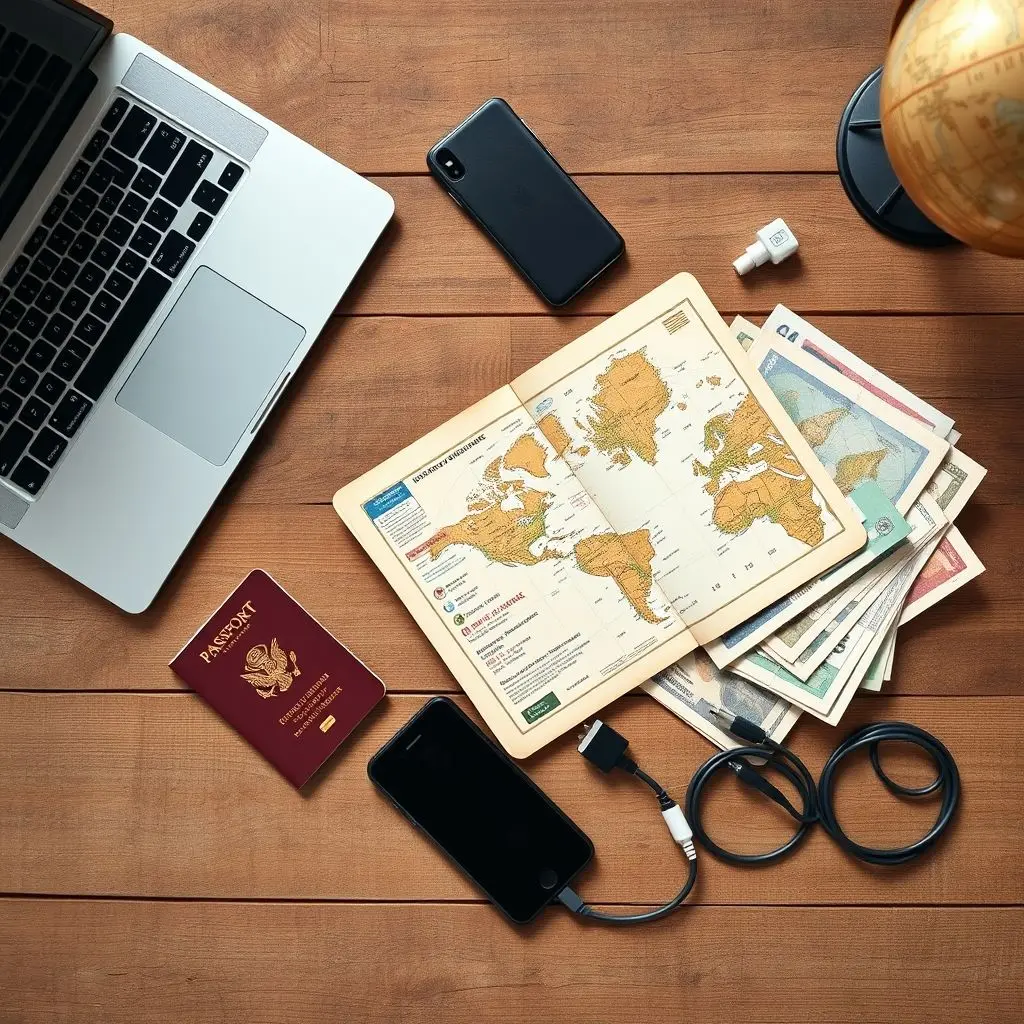Ever stare out the office window, feeling that familiar tug of wanderlust? That sense that there must be more than the daily commute and the same four walls? What if your workspace could stretch beyond your street, beyond your city, even beyond your country?
Imagine swapping traffic jams for jungle sounds, fluorescent lights for golden sunsets, and water cooler chat for conversations in a language you’re just learning. This isn’t just a vacation fantasy; for a growing number of people, it’s everyday life. It’s called Digital Nomadism.
It’s a lifestyle where technology isn’t just a tool for your job, but the key that unlocks a world of possibilities, allowing you to earn a living from literally anywhere with a reliable internet connection. It’s about blending work, travel, and life into a seamless, enriching experience.
Want a quick visual taste of what this freedom looks like? Check out this short clip we put together:
That little video captures the essence beautifully, doesn’t it? The dream of breaking free from the conventional, finding balance, staying productive, and soaking up new cultures.
Table of Contents
What Exactly *Is* Digital Nomadism?
At its heart, digital nomadism is about achieving location independence through remote work. Unlike traditional travelers or even long-term tourists, digital nomads maintain a professional life while continuously moving from one location to another. They use laptops, smartphones, and the internet to perform their jobs, whether they are:
- Freelancers: Offering services like writing, graphic design, web development, social media management, or consulting to clients globally.
- Remote Employees: Working full-time for a company that allows them to work from anywhere, often communicating and collaborating with colleagues via digital tools.
- Online Entrepreneurs: Running their own online businesses, e-commerce stores, blogs, or software companies that don’t require a fixed physical presence.
It’s more than just remote work; it’s remote work enabling a *mobile* and *exploratory* lifestyle. The ‘nomad’ part implies movement and a lack of a permanent base, although some digital nomads might settle in one place for several months before moving on.
Why Do People Embrace This Lifestyle?
The allure is multifaceted, drawing individuals from diverse backgrounds seeking something different.
- Unparalleled Freedom & Flexibility: This is perhaps the biggest draw. The ability to set your own schedule (within work requirements), choose where you live and work, and not be tied down to a specific office or city.
- Travel and Cultural Immersion: Digital nomads get to experience the world not just as tourists, but by living in places, even if temporarily. This allows for deeper cultural understanding, learning new languages, and meeting diverse communities.
- Improved Work-Life Balance: While it requires discipline, the freedom to structure your day can allow for better integration of personal interests, fitness, and relaxation alongside work. Imagine taking a surf break between meetings or exploring ancient ruins after finishing your tasks for the day.
- Lower Cost of Living: By strategically choosing destinations with a lower cost of living than their home country or previous location, some digital nomads can make their money go further, saving more or working fewer hours.
- Escape from the Mundane: For many, it’s an escape from routine, office politics, and the feeling of being stuck in a conventional path.
- Personal Growth: Navigating new environments, cultures, and logistical challenges fosters resilience, adaptability, and self-reliance.

The Flip Side: Navigating the Challenges
While the highlights are enticing, digital nomadism isn’t always an endless holiday. It comes with unique hurdles that require careful planning and resilience.
- Maintaining Productivity and Routine: Working without a traditional office structure requires significant self-discipline. Distractions are everywhere, and finding a productive workspace can be challenging, especially when constantly moving.
- Internet Connectivity: Reliable, high-speed internet is the lifeline of a digital nomad. Finding it consistently in every location can be a struggle, from slow Wi-Fi in remote areas to dealing with local provider issues.
- Loneliness and Community: Constantly moving can make it difficult to build deep, lasting relationships. While digital nomad communities exist, combating feelings of isolation requires effort.
- Visa and Immigration Issues: Most countries don’t have specific visas for digital nomads. Navigating tourist visas, understanding length-of-stay limits, and dealing with immigration laws across different nations is complex and requires careful research. Overstaying or working illegally can have serious consequences.
- Taxes and Finances: Determining tax residency when you don’t have a permanent home can be incredibly complicated. Managing finances across multiple currencies and countries, and dealing with international banking fees, requires careful planning.
- Healthcare and Insurance: Accessing reliable healthcare abroad and finding comprehensive international health insurance is crucial and can be expensive.
- Finding Suitable Accommodation: While options like Airbnb, hostels, and co-living spaces exist, finding comfortable, affordable accommodation with good workspace and internet can take time and effort in each new place.
- Burnout: The pressure to constantly work *and* explore, combined with logistical stresses, can lead to burnout if not managed properly.
The Essential Pillars Supporting the Lifestyle
Succeeding as a digital nomad relies on mastering several key areas:
Remote Work Skills and Opportunities
The foundation is the ability to earn income remotely. This requires marketable skills that can be delivered online. Popular fields include IT, marketing, writing, design, education, customer support, and consulting. Finding opportunities involves exploring freelance platforms, remote job boards, and networking.
Technology as Your Lifeline
A reliable laptop, smartphone, and essential software (communication apps, cloud storage, project management tools) are non-negotiable. Portable Wi-Fi hotspots and power banks are also crucial backups. Staying updated with tech trends and cybersecurity is vital.
Financial Management Across Borders
This includes setting up international bank accounts, using transfer services like Wise (formerly TransferWise) or PayPal, budgeting for variable costs (travel, accommodation), and handling income streams that might be in different currencies. Understanding the tax implications of earning income while being location independent is paramount (consulting with a tax professional specializing in international income is highly recommended).
Navigating Logistics: Visas, Accommodation, Health
Thorough research into visa requirements for target countries is essential. Planning accommodation in advance, especially when arriving in a new city, reduces stress. Comprehensive international health insurance designed for travelers/nomads is a necessity, not a luxury. Staying informed about safety and local customs is also key.

Who Becomes a Digital Nomad?
The image of a 20-something backpacker working from a beach bar is just one facet. Digital nomads come from all walks of life:
- Single individuals and couples
- Families (though this adds significant complexity!)
- People across various age groups
- Professionals switching from traditional jobs
- Retirees with online income streams
It’s less about age or background and more about a mindset: an openness to change, adaptability, independence, and a drive for exploration combined with the ability to work remotely.
Getting Started: Taking the First Steps
Thinking of taking the plunge? Here’s a simplified roadmap:
- Secure Remote Income: This is step one. Find a job you can do remotely or build a freelance career/online business. Ensure it provides a stable enough income to support your lifestyle.
- Save Sufficient Funds: Have a cushion for emergencies, initial setup costs (insurance, equipment), and periods where income might be inconsistent.
- Research Destinations: Look into visa requirements, cost of living, internet availability, safety, and lifestyle suitability for your needs.
- Sort Out Logistics: Get comprehensive international health insurance. Determine your tax situation (seek professional advice!). Plan initial travel and accommodation.
- Start Slow (Optional but Recommended): Maybe try working remotely from a nearby city or country for a few weeks or months before committing to long-term, continuous travel. This helps you test your setup and discipline.
Popular Digital Nomad Hubs
Certain cities and countries have become magnets for digital nomads due to factors like visa friendliness, affordability, good internet, and existing nomad communities.
- Lisbon, Portugal: European favorite with a relaxed vibe, good infrastructure, and a digital nomad visa.
- Chiang Mai, Thailand: Long-standing hub in Southeast Asia known for affordability and strong community.
- Medellin, Colombia: “City of Eternal Spring” offering vibrant culture and improving infrastructure.
- Bali, Indonesia: Famous for its spiritual atmosphere, beautiful landscapes, and large nomad community (visa rules are evolving).
- Mexico City, Mexico: A vast cultural capital with relatively easy entry for many nationalities.
This is just a snapshot; the list of potential locations is constantly growing!

Frequently Asked Questions About Digital Nomadism
Q: Do I need a special visa to be a digital nomad?
A: It depends on the country and your nationality. Some countries are starting to offer specific digital nomad visas (like Portugal, Spain, Estonia), which are often the easiest legal route. In others, nomads use tourist visas, which usually do NOT permit working for local companies and have duration limits. Research is crucial, and working illegally can have serious consequences.
Q: How do digital nomads handle taxes?
A: This is complex! Tax obligations usually depend on your tax residency, which isn’t always where you are physically located. Factors include where you spend most of your time, where your ‘domicile’ is, and international tax treaties. Many nomads aim to break tax residency in their home country, but this requires meeting specific criteria. Consulting with a tax professional experienced in expatriate or international tax is highly recommended.
Q: Is digital nomadism expensive?
A: It can be cheaper or more expensive than your traditional lifestyle, depending entirely on where you choose to travel and live, and your spending habits. Living in Southeast Asia or parts of Latin America might be cheaper than a major Western city, while living in Western Europe or Australia could be more expensive.
Q: How do digital nomads find work?
A: Many transition from existing remote jobs, while others find work on platforms like Upwork, Fiverr, Toptal (for freelancers), or remote job boards like Remote.co, We Work Remotely, and FlexJobs. Some build their own businesses.
Q: What about community? Isn’t it lonely?
A: It can be, but there are strong digital nomad communities online (Facebook groups, forums) and in popular nomad hubs. Co-working spaces, meetups, and co-living arrangements help connect with like-minded individuals. Building relationships requires conscious effort.
Embracing the Horizon
Digital nomadism is certainly not for everyone. It requires adaptability, self-reliance, discipline, and a willingness to navigate constant change and logistical complexities. But for those who crave freedom, adventure, and the chance to integrate work and life on a truly global scale, it offers a compelling alternative to the conventional path.
It’s a lifestyle that pushes boundaries, challenges perspectives, and promises a life rich in experiences. If the idea of a worn passport and a laptop light guiding you to new sunrises resonates deep within you, perhaps the world is indeed calling to be your next office.





